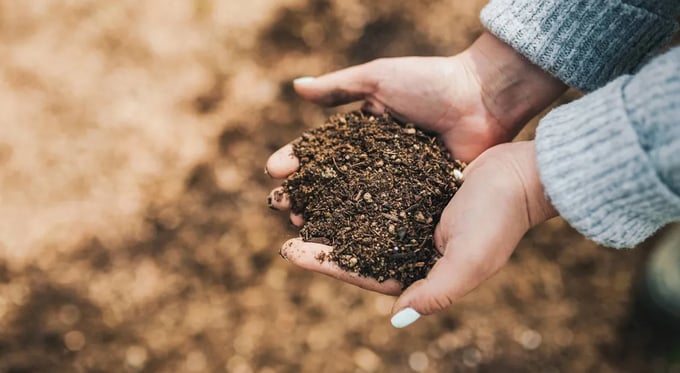May 19, 2025 | 13:55 GMT +7
May 19, 2025 | 13:55 GMT +7
Hotline: 0913.378.918
May 19, 2025 | 13:55 GMT +7
Hotline: 0913.378.918

Representational image of fertlized soil.
The production and use of chemical fertilizers contribute to a significant amount of greenhouse gas emissions such as nitrous oxide and are often energy-intensive as they employ the Haber-Bosch process which requires high temperatures and pressures.
To avoid some of these negative consequences, farmers often use biofertilizers, which contain beneficial microorganisms like nitrogen-fixing bacteria, to enhance soil fertility and support plant health. By using fewer chemical fertilizers, these methods are considered part of environmentally friendly and sustainable agricultural practices. However, they do not provide protection against pests.
Now, MIT scientists have found a way to optimize bacteria to safeguard plants against invasive species so that they can ultimately replace chemical fertilizers in farms.
In addition to giving plants the nutrients they require, bacteria aid in soil regeneration and insect protection. But because these microorganisms are heat- and humidity-sensitive, manufacturers were previously unable to produce them on the large scales farmers required.
MIT chemical engineers have developed a metal-organic coating that shields bacterial cells from harm caused by their environment without obstructing their development or ability to operate. This process makes them ideal at protecting plants from pesky pests while remaining sustainable and safe.
“They can also withstand heat up to 132 degrees Fahrenheit, which means that you wouldn’t have to use cold storage for these microbes,” said Ariel Furst, the Paul M. Cook Career Development Assistant Professor of Chemical Engineering at MIT and senior author of the new study.
Both the metals used for the coatings, including iron, manganese, aluminum, and zinc, and the organic compounds are considered safe by the US Food and Drug Administration. The compound is called polyphenol which is a substance that is naturally occurring in plants and has antioxidant properties preventing cellular damage.
“We are using these natural food-grade compounds that are known to have benefits on their own, and then they form these little suits of armor that protect the microbes,” Furst said.
The researchers tested 12 different types of coatings and found them all to safeguard the bacteria from temperatures of up to 50 degrees Celsius (122 degrees Fahrenheit) and from humidity levels of up to 48 percent. They also noted that the coatings improved the plants’ seeds’ germination rate by 150 percent. Seed types included dill, corn, radishes, and bok choy.
In order to commercialize the coated bacteria for extensive application in regenerative agriculture, Furst has now founded a company called Seia Bio. She believes that small-scale farmers who lack the fermenters required to cultivate these microorganisms will find microbial fertilizers more affordable due to the low cost of the production process.
“When we think about developing technology, we need to intentionally design it to be inexpensive and accessible, and that’s what this technology is. It would help democratize regenerative agriculture,” she explained.
Study abstract:
Chemical fertilizers have been crucial for sustaining the current global population by supplementing overused farmland to support consistent food production, but their use is unsustainable. Pseudomonas chlororaphis is a nitrogen-fixing bacterium that could be used as a fertilizer replacement, but this microbe is delicate. It is sensitive to stressors, such as freeze-drying and high temperatures. Here, we demonstrate protection of P. chlororaphis from freeze-drying, high temperatures (50 oC), and high humidity using self-assembling metal-phenolic network (MPN) coatings. The composition of the MPN is found to significantly impact its protective efficacy, and with optimized compositions, no viability loss is observed for MPN-coated microbes under conditions where uncoated cells do not survive. Further, we demonstrate that MPN-coated microbes improve germination of seeds by 150% as compared to those treated with fresh P. chlororaphis. Taken together, these results demonstrate the protective capabilities of MPNs against environmental stressors and represent a critical step towards enabling the production and storage of delicate microbes under nonideal conditions.
(IE)

(VAN) Fourth most important food crop in peril as Latin America and Caribbean suffer from slow-onset climate disaster.

(VAN) Shifting market dynamics and the noise around new legislation has propelled Trouw Nutrition’s research around early life nutrition in poultry. Today, it continues to be a key area of research.

(VAN) India is concerned about its food security and the livelihoods of its farmers if more US food imports are allowed.

(VAN) FAO's Director-General emphasises the need to work together to transform agrifood systems.

(VAN) Europe is facing its worst outbreak of foot-and-mouth since the start of the century.

(VAN) The central authorities, in early April, released a 10-year plan for rural vitalization.

(VAN) Viterra marked a significant milestone in its carbon measurement program in Argentina, called Ígaris, reaching 1 million soybean hectares measured.